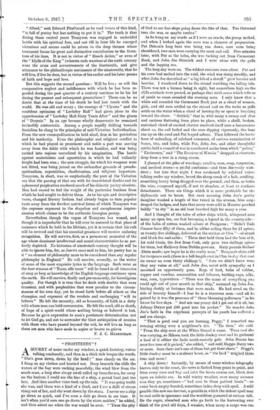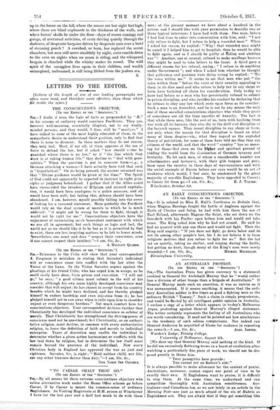" PR ON II EERS " ?
ASCURRY of noise under my window, a quick footstep, yokes talkMg confusedly, and then in a thick rich brogue the words, "She's gone down, down by the head !" rose clearly on the air. I flung on my clothes and hurried out. Deep beneath the cliffs the waters of the bay were rocking peacefully, the wind blew from the aouth-west, a long slow sleepy swell rolled up fromthe sea, far away on the horizon I could see the line of a ship, a patrol boat just too late. And then another voice took up the tale. "It was going washt she was, and there was a kind of a thud, and I seo a drift of steam rising out of her, and she went down by the stam. I never ace a ship go down as quick, and I've seen a dale go down in me time. It isn't often you'd seen one go down by the stern neither," he added, and then asked me when the war would be over. "Twos the pity Of God to see fine ships going down the like of that Ten thousand tons she was, or maybe twelve."
As he hung on my words as if I were an oracle, the group melted, and when I looked again the cove was a clamour of preparation.
Pat Drinan's long boat was being run down, oars were being shouldered, two men were carrying the most and Bail. Five minutes later, with Pat at the helm, she was tacking out from Cormorant Rook, and John Joe Shinnick and I were alone with the gulls and the lapping sea.
The long day wore on. The wildest rumours were afloat. Pat and his crew had melted into the void, the wind was rising steadily, and what John Joe described as "a big lob of a shwell " grew heavier and heavier. I wandered down to the strand watching the falling tide. There was not a human being in sight, but somewhere high on the cliffs sentinel', were posted, or perhaps that sixth sense which tells us of profit to come sounded the warning note. I only know that a white sail rounded the Cormorant Rock just as a cloud of women, girls, and old men settled on the strand and on the rocks as gulls settle on the water when a shoal of herring-fry or sprat is breaking toward the shore. "Settled," that is, with many a swoop and dive and anxious fluttering from place to place, white a shrill, broken, sustained chord of excited chatter resolved itself into a harmonious shout as, the sail furled and the oars dipping vigorously, the boat ran up on the sand and Pat leaped ashore. Then followed the hectic hour of unloading, of subdued comment, of curious examination of boxes, tins, and bales, while Pat, John Joe, and other thoughtful spirits held a council of warn smothered asides from which "police." "Excisemen," and" The Receiver of Wrecks" dropped as chestnuts drop from a tree in a rising storm.
I glanced at the piles of wreckage, candles, oars, soap, turpentine, and medical stores—a pitiful confusion—and then discreetly with- drew ; but Into that night I was awakened by subdued voices talking under my window, heard the sharp croak of a bolt, scuffling. Something heavy being dragged over the ground, and than, ae befits the wise, composed myself, if not to slumber, at least to studious detachment. There are things which it is more profitable for the diplomatic not to know. But next morning John Joe's pretty
daughter washed a length of fine tweed in the stream, blue Barge draped the hedges, and hats that never were sold in Munster perched boldly "to dry" in an old boat beached high for many a year.
And I thought of the tales of other ships which, whispered over many an open fire, are fast becoming a legend in the countryside—
of the bales of cotton washed ashore at Poulgurm "Didn't Tails Connor have fifty of them, and he afther selling them for £1 apiece, or twenty-five shillings, delivered at the station at Clan "—of skunk and black fox and sable: "Them that held them had the beat of it, for ould Grein, the Jew from Cork, only gave two shillings apiece for them, but Hallissey from Dublin gave six. Sixty pounds Michael Ahern made; aye begor he is the crafty man." Musquash skins sold for twopence each (there is a full-length coat in Clon to-day that coat its owner an even thirty shillings !). "Stirs we didn't know were they any value at all," said John Joe, moist with sympathy as mourhed an opportunity gone. Kegs of lard, bales of rubber, copper and vaaeline, ammunition and tobacco, bathing-caps, silks,
wax, corn, typewriMrs—" There was the name of everything you
could spit out of your mouth in that ship," summed up John Joe, hinting darkly at fortunes that were made. He had erred on the side of honesty himself—I fear he is a timorous men—and all he gained by it was the presence of " three blooming policemen" in his hews for five days. "And not one penny did I get out of it all, but Johnny Dwyer put £90 good into his pocket." No wonder John Joe's faith in the copybook precepts of his youth has suffered a sad sea change.
"That is good coal you are burning, Peggy," I remarked one evening sitting over a neighbour's fire. " 'Tis then," she said. "From the ship over at the White Strand it came. 'Twos coal she was carrying, so Mikeen took the little donkey over and he gathered a load of it either the lasht south-easterly gale. John Dunne has near five tons of it picked," mho added, "and ould Maggie Barry two or more. Sure there isn't one of them but got their share." Peggy's little donkey must be a stalwart beast, as "the load" weighed thtee tons and more A ship down! Instantly, by means of some wireless telegraphy !mown only to the roust, the news is flashed from point to point, and from every cove and bay and inlet the boats swarm out, black dots upon an infinite sea. In wild wintry weather, over sunny summer seas they go, sometimes—" bad can to them pathrol boats "—to come back empty-handed, sometimes laden deep with spoil. A wild gamble this new sea-harvest, a gamble in which the richest spoil may be cast aside in ignorance and the worthless garnered at serious risk. Do the eager, absorbed men who go forth to the harvesting ever think of the good old days, I wonder, when many a cargo was ran up to the house on the hill, where the rooms are but eight feet high, where there are blind cupboards in the thickness of the walls, and *ahem horses' skulls lie under the floor—days of secret comings and goings, of nocturnal activities, of carts driving quietly through the darkness, of desperate bargains driven by desperate men over a bowl of steaming punch ? A cowshed, or barn, has replaced the secret clambers, but men still move stealthily by night, carts rumble down to. the cove on nights when no moon is riding, and the whispered bargain is clenched while the whisky makes its round. The wild spirit of the smugglers lives again in their children, and wealth unimagined, undreamed, is still being filched from the jealous sea.
s.





























 Previous page
Previous page